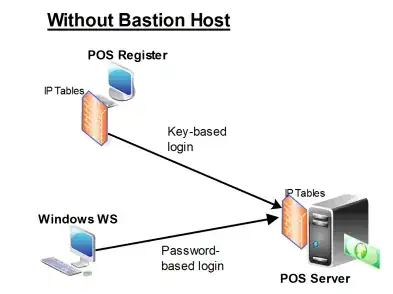I am currently in the process of upgrading the SSL certificates for various websites that I manage from SHA1 to SHA2 compatible certificates.
To date we have always used 'RSA' as the key exchange mechanism on our SSL certificates and therefore I decided to continue doing so when generating the Certificate Signing Request for the replacement certificates.
Within my development environment, I have replaced several certificates and prioritised SHA256 (SHA-2) based cipher suites on the web servers.
I have noticed that Google Chrome 42 and Firefox 37.0.2 are still selecting a SHA1 based cipher suite TLS_RSA_WITH_AES_256_CBC_SHA.
(I have not properly tested Internet Explorer yet)
In order to determine which cipher suites Chrome 42 and Firefox 37.0.2 support, I have have performed a network trace and located the TLSCipherSuites within the ClientHello.
Chrome 42:
TLSCipherSuites: Unknown Cipher
TLSCipherSuites: Unknown Cipher
TLSCipherSuites: Unknown Cipher
TLSCipherSuites: TLS_ECDHE_ECDSA_WITH_AES_128_GCM_SHA256 { 0xC0,0x2B }
TLSCipherSuites: TLS_ECDHE_RSA_WITH_AES_128_GCM_SHA256 { 0xC0,0x2F }
TLSCipherSuites: TLS_DHE_RSA_WITH_AES_128_GCM_SHA256 { 0x00, 0x9E }
TLSCipherSuites: TLS_ECDHE_ECDSA_WITH_AES_256_CBC_SHA { 0xC0,0x0A }
TLSCipherSuites: TLS_ECDHE_RSA_WITH_AES_256_CBC_SHA { 0xC0,0x14 }
TLSCipherSuites: TLS_DHE_RSA_WITH_AES_256_CBC_SHA { 0x00, 0x39 }
TLSCipherSuites: TLS_ECDHE_ECDSA_WITH_AES_128_CBC_SHA { 0xC0,0x09 }
TLSCipherSuites: TLS_ECDHE_RSA_WITH_AES_128_CBC_SHA { 0xC0,0x13 }
TLSCipherSuites: TLS_DHE_RSA_WITH_AES_128_CBC_SHA { 0x00, 0x33 }
TLSCipherSuites: TLS_ECDHE_ECDSA_WITH_RC4_128_SHA { 0xC0,0x07 }
TLSCipherSuites: TLS_ECDHE_RSA_WITH_RC4_128_SHA { 0xC0,0x11 }
TLSCipherSuites: TLS_RSA_WITH_AES_128_GCM_SHA256 { 0x00, 0x9C }
TLSCipherSuites: TLS_RSA_WITH_AES_256_CBC_SHA { 0x00, 0x35 }
TLSCipherSuites: TLS_RSA_WITH_AES_128_CBC_SHA { 0x00, 0x2F }
TLSCipherSuites: TLS_RSA_WITH_RC4_128_SHA { 0x00,0x05 }
TLSCipherSuites: TLS_RSA_WITH_RC4_128_MD5 { 0x00,0x04 }
TLSCipherSuites: TLS_RSA_WITH_3DES_EDE_CBC_SHA { 0x00,0x0A }
TLSCipherSuites: Unknown Cipher
Firefox 37.0.2:
TLSCipherSuites: TLS_ECDHE_ECDSA_WITH_AES_128_GCM_SHA256 { 0xC0,0x2B }
TLSCipherSuites: TLS_ECDHE_RSA_WITH_AES_128_GCM_SHA256 { 0xC0,0x2F }
TLSCipherSuites: TLS_ECDHE_ECDSA_WITH_AES_256_CBC_SHA { 0xC0,0x0A }
TLSCipherSuites: TLS_ECDHE_ECDSA_WITH_AES_128_CBC_SHA { 0xC0,0x09 }
TLSCipherSuites: TLS_ECDHE_RSA_WITH_AES_128_CBC_SHA { 0xC0,0x13 }
TLSCipherSuites: TLS_ECDHE_RSA_WITH_AES_256_CBC_SHA { 0xC0,0x14 }
TLSCipherSuites: TLS_DHE_RSA_WITH_AES_128_CBC_SHA { 0x00, 0x33 }
TLSCipherSuites: TLS_DHE_RSA_WITH_AES_256_CBC_SHA { 0x00, 0x39 }
TLSCipherSuites: TLS_RSA_WITH_AES_128_CBC_SHA { 0x00, 0x2F }
TLSCipherSuites: TLS_RSA_WITH_AES_256_CBC_SHA { 0x00, 0x35 }
TLSCipherSuites: TLS_RSA_WITH_3DES_EDE_CBC_SHA { 0x00,0x0A }
Webserver
My webservers are running Windows Server 2008 R2 and supports the following cipher suites (note - this is the default preference order, I have since prioritised all SHA256 based suites:
TLS_RSA_WITH_AES_128_CBC_SHA256,TLS_RSA_WITH_AES_128_CBC_SHA,TLS_RSA_WITH_AES_256_CBC_SHA256,
TLS_RSA_WITH_AES_256_CBC_SHA,TLS_RSA_WITH_RC4_128_SHA,TLS_RSA_WITH_3DES_EDE_CBC_SHA,
TLS_ECDHE_RSA_WITH_AES_128_CBC_SHA256_P256,TLS_ECDHE_RSA_WITH_AES_128_CBC_SHA256_P384,
TLS_ECDHE_RSA_WITH_AES_128_CBC_SHA_P256,TLS_ECDHE_RSA_WITH_AES_128_CBC_SHA_P384,
TLS_ECDHE_RSA_WITH_AES_256_CBC_SHA_P256,TLS_ECDHE_RSA_WITH_AES_256_CBC_SHA_P384,
TLS_ECDHE_ECDSA_WITH_AES_128_GCM_SHA256_P256,TLS_ECDHE_ECDSA_WITH_AES_128_CBC_SHA256_P256,
TLS_ECDHE_ECDSA_WITH_AES_256_GCM_SHA384_P384,TLS_ECDHE_ECDSA_WITH_AES_256_CBC_SHA384_P384,
TLS_ECDHE_ECDSA_WITH_AES_128_CBC_SHA_P256,TLS_ECDHE_ECDSA_WITH_AES_128_CBC_SHA_P384,
TLS_ECDHE_ECDSA_WITH_AES_256_CBC_SHA_P256,TLS_ECDHE_ECDSA_WITH_AES_256_CBC_SHA_P384,
TLS_DHE_DSS_WITH_AES_128_CBC_SHA256,TLS_DHE_DSS_WITH_AES_128_CBC_SHA,
TLS_DHE_DSS_WITH_AES_256_CBC_SHA256,TLS_DHE_DSS_WITH_AES_256_CBC_SHA,
TLS_DHE_DSS_WITH_3DES_EDE_CBC_SHA,TLS_RSA_WITH_RC4_128_MD5,SSL_CK_RC4_128_WITH_MD5,
SSL_CK_DES_192_EDE3_CBC_WITH_MD5,TLS_RSA_WITH_NULL_SHA256,TLS_RSA_WITH_NULL_SHA
The only SHA256 cipher suite present on Windows Server 2008 R2 that is supported by Chrome 42 and Firefox 37.0.2 is TLS_ECDHE_ECDSA_WITH_AES_128_GCM_SHA256 (which in Server 2008 R2 has _P256 appended to the name). But in order to support this suite, I would have to reissue our certificates changing the key exchange mechanism from using RSA to ECDSA (Elliptic Curve Digital Signature Algorithm). I have in fact tried this and it works fine - but many older browsers do not support Elliptic Curve Cryptography. So this isn't a viable solution.
- So it there a way to make Firefox and Chrome select a SHA256 cipher suite on a Windows Server 2008 R2 web server that does not break compatibility with older browsers?
- Can additional cipher suites be added to the OS?
28/04/15 UPDATE:
Thanks to those who have answered for the added clarity regarding key-exchange algorithm and signature algorithm.
I would like browsers that are capable of using a SHA256 cipher suite performing message authentication using SHA2 to do so.
But the problem remains that of the available SHA256 cipher suites within Windows Server 2008 R2, the only one with support in both Chrome and Firefox is TLS_ECDHE_ECDSA_WITH_AES_128_GCM_SHA256. And in order to use this cipher suite, I require a ECDSA-signed certificate.
As I understand it, Elliptic Curve Cryptography lacks support on some older browsers/operating systems. As mentioned in my question (although I got the terminology wrong), I did create a ECDSA-signed certificate and although I have not done extensive testing, thus far I have seen that IE7 and IE8 running on Windows XP SP3 fail to load my sites (over HTTPS) and simply produce an "Internet Explorer cannot display the webpage" message.
Granted, Windows XP is now an obsolete OS but I'm concerned that browsers/operating systems that are 'old' but still 'supported' may fail in the same way. Therefore, I am interested in finding a solution using an RSA signed certificate - but that appears to be impossible. Am I right about this?
